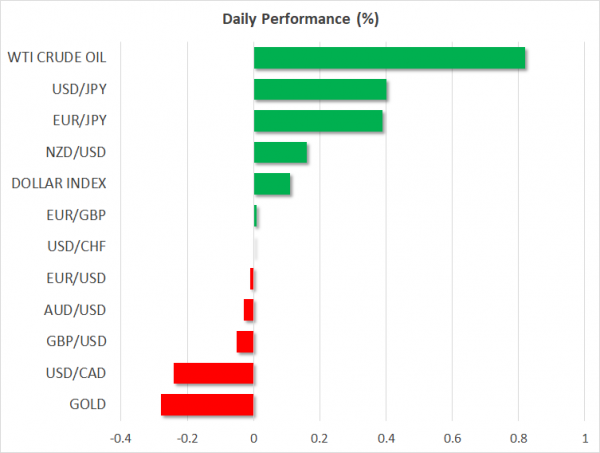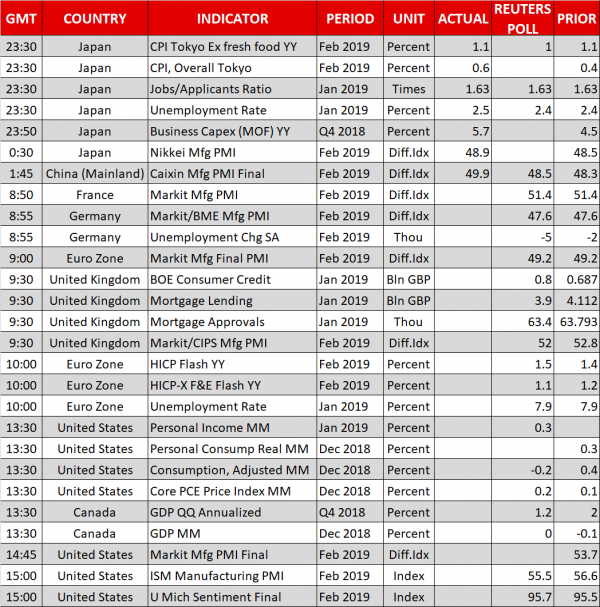- Dollar rebounds after US GDP beats expectations, looks to ISM manufacturing index
- Yen falls to two-month lows as solid Chinese PMIs reinvigorate risk appetite
- Busy schedule today: Eurozone inflation data, UK manufacturing PMI, Canadian GDP
Dollar inches up as US GDP tops forecasts, but stocks struggle
The dollar was the main winner in Thursday’s session, drawing support from stronger-than-anticipated US GDP data for Q4 to outperform all its G10 peers outside of the Swiss franc. Economic growth clocked in at a 2.6% annualized pace, overcoming the forecast for a more severe slowdown to 2.3%, and likely allaying some concerns around the health of the US economy. Accordingly, US Treasury yields rose as investors cut back on Fed rate-cut bets, with the market implied odds for a rate cut this year shifting back towards zero.
Despite the ‘good news’ on the economy, US stock markets struggled, closing modestly in the red for a third straight session as the fading probability for near-term Fed easing likely curbed the appeal of riskier assets. That said, futures are pointing to a much higher open today, following some trade headlines that US officials are preparing a final deal that could be signed by the two Presidents as soon as mid-March. Solid manufacturing PMI data out of China overnight are probably helping as well (see below).
Today, the dollar and US equities will take their cue from a raft of crucial data releases. Personal income and spending, as well as the core PCE prices index for December are all on the docket, though considering that these may be seen as somewhat out-of-date by now, traders could pay more attention to the ISM manufacturing PMI for February.
Yen crumbles as China’s Caixin PMI rebounds, calms slowdown fears
Asian markets are mostly higher on Friday, after China’s Caixin manufacturing PMI for February rose by more than expected, calming some nerves around a prolonged slowdown in the world’s second-largest economy. The solid print probably came as a surprise, considering that the official manufacturing PMI for the same month – released yesterday – declined further into contractionary territory, sending the opposite signal on growth.
Consequently, the safe haven Japanese yen is getting hammered in this risk-on environment, touching fresh two-month lows against both the dollar and the euro. Separately, news that Pakistan will release a captured Indian pilot as a ‘peace gesture’ likely eased fears regarding an escalation in the geopolitical sphere, further weighing on the defensive yen. The outlook for the yen remains clouded, particularly considering that economic data out of Japan have been losing steam lately, putting to bed speculation for any BoJ tightening in the foreseeable future.
Day ahead: Euro area inflation, UK manufacturing PMI, Canadian GDP data
The calendar is relatively packed on Friday, as besides the above-mentioned US releases, there are also several other first-tier data on the schedule.
Out of the Eurozone, preliminary inflation figures for February could shed some light on whether or not the ECB will recalibrate its policy language in a more dovish direction at next week’s policy meeting. It’s noteworthy that the bloc’s composite PMI for the month showed that prices charged rose at the slowest pace in 18 months, which suggests scope for a negative surprise in the CPIs today. Any disappointment, particularly in the core rate, could drag the euro lower.
In the UK, the manufacturing PMI for February is due, though as always, the pound will likely be more responsive to anything Brexit-related.
In Canada, GDP data for Q4 will hit the markets. The loonie has firmed a little lately, supported by the recovery in oil prices; the correlation between these two assets has returned with a vengeance lately, after disappearing for most of last year.


